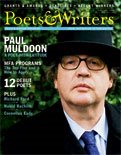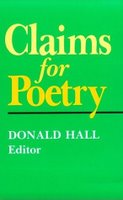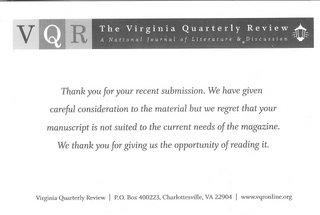 However, if you're thinking about trying out for the MFA squad, it's worth picking up a copy of the current issue of Poets & Writers (Nov/Dec 2006), which features a section on MFA programs, including a piece written by my friend Nell Henderson on the top five in the country. For those keeping score, they are currently the University of Iowa (#1), Johns Hopkins and the University of Houston (tied for #2), and Columbia and the University of Virginia (tied for #3). My money's on UVA to take out Hopkins in the finals.
However, if you're thinking about trying out for the MFA squad, it's worth picking up a copy of the current issue of Poets & Writers (Nov/Dec 2006), which features a section on MFA programs, including a piece written by my friend Nell Henderson on the top five in the country. For those keeping score, they are currently the University of Iowa (#1), Johns Hopkins and the University of Houston (tied for #2), and Columbia and the University of Virginia (tied for #3). My money's on UVA to take out Hopkins in the finals.Nell is one of the smartest people I know, so it's no surprise that she brings some healthy skepticism to the task of comparing these programs to one another and to the central premise that creative writing programs can be objectively scored or ranked in the first place. I also appreciate her attention to one detail that is often, bewilderingly, brushed aside: the enormous costs of many of these programs, and to what extent these institutions are able to offset those costs.
Anyway, if you're considering applying for an MFA, check out Nell's article first. It'll give you a good sense of the top (ranked) programs and possibly get you thinking about some of the other issues and questions surrounding these programs as well.



